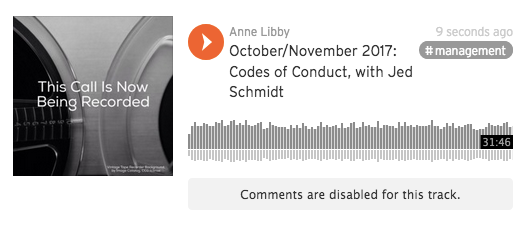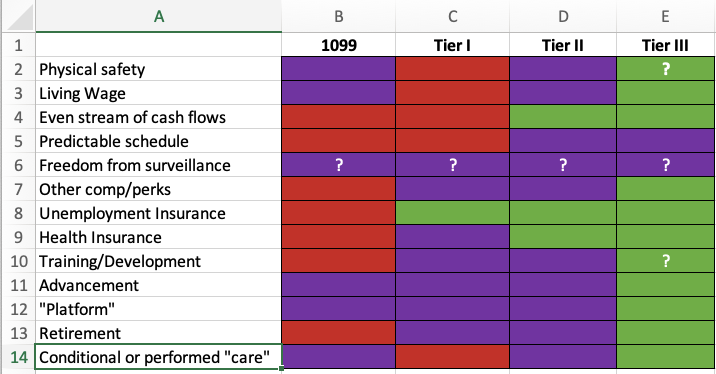Codes of Conduct, On Management #23
Dateline November 22, 2019 lol: I’ve been slowly and not terribly surely re-posting my old newsletters to the Substack archive.
Re-reading this 2017 issue in 2019, and seeing how some stories I’ve shared and discussed here have evolved — I had to remind myself: it is a newsletter!
This month, can a code of conduct help to bring an organization's values to life?
BrooklynJS is a friendly, vibrant community. Co-founder Jed Schmidt talked with me about their Code of Conduct.
Also, my observations on an institution in the midst of remediating awful conduct -- partly in public. And some tech community expertise on codes of conduct.
Also, #management nerds wanted for a project to build community around a healthy "future of work"...read on!
Thank you for inviting me to your in-box.
Sign up to get the free newsletter!
If you can't treat someone from another gender -- whether that's a man or a woman -- with dignity and respect, then you need to get out. If you demean someone in any way, then you need to get out. And If you can't treat someone from another race, or a different color skin, with dignity and respect, then you need to get out.
Jay Silveria
Someone in the US Air Force Academy's prep school posted racial slurs on a student's message board. This story is still unfolding in an organization that has battled harassment, sexual assault, cheating, and more.
USAFA's Honor Code is not enough.
In a compact presentation, USAFA Superintendant Jay Silveria is explicit about behavior that's not acceptable.
New-ish to his role, Silveria is visibly, physically, backed by his staff; they're on the hook to uphold and live the behaviors that embody their values.
What would it be for your CEO and their team to stand up to problems like this? To tell people what's expected, and encourage discussion when expectations aren't met?
Leaders, you're building culture. What it would take to tell people who would disrupt your community to shape up or ship out?
It's not enough to post your values on your website. We've got to talk about what our values look like, in action. And then we have to walk our talk.
Creating the Brooklyn JS Code of Conduct, with Jed Schmidt
The JSConf Code of Conduct codifies values and expected behaviors for people at community gatherings.
Jed Schmidt is a web developer, Japanese translator, home renovator, and dad, as well as a founder of Brooklyn JS. Jed and I talked about what he's learned about codes of conduct.
We also talked about whether we're in a "watershed" moment. (Spoiler alert: I don't think so.)

- Here's the Code of Conduct for BrooklynJS.
- A code of conduct isn't enough, by Maggie Zhou, Alex Clemmer, and Lindsey Kuper. (h/t Ashe Dryden)
- Best practices for anti-harassment policies, and more, in an epic US EEOC report.
Jed and I didn't talk about the fact that men can also be harassed. It's not just women. (Not by a long shot.)
November 2019 editorial note: Jed and I taped our discussion in the autumn of 2017, just as reports about Harvey Weinstein’s behavior started to hit the media, and before the explosion of #MeToo stories about the impact of workplace harassment.
Reflected in our conversation is the the degree to which I underestimated the power imbalance between Weinstein and Ashley Judd, and its impact.
I regret — and apologize for — my 2017 assessment of the situation.
Film director Peter Jackson has admitted to blacklisting actors Ashley Judd and Mira Sorvino in response to a “smear campaign” orchestrated by accused sexual predator Harvey Weinstein.
“I recall Miramax telling us they were a nightmare to work with and we should avoid them at all costs,” Jackson said, referencing the production company Weinstein ran with his brother Bob. As a direct result, he said, both women fell out of the running for parts in his Lord of the Rings series.
Peter Jackson: I blacklisted Ashley Judd and Mira Sorvino under pressure from Weinstein, by Molly Redden at The Guardian.
Codes of conduct: definitions and more
...a set of rules outlining the social norms and rules and responsibilities of, or proper practices for, an individual, party or organization, via Mozilla Science Lab.
...a public statement that sets the ground rules for participating in an event, via Ashe Dryden.
...a formal documentation of your event/community/project’s standards of behavior, and a statement of your process for handling breaches of those standards, via Erin Kissane.
Effective codes of conduct List specific common behaviors that are not okay; Include detailed directions for reporting violations; Have a defined and documented complaint handling process, per the Ada Initiative.
...sets company norms for behavior, per Project Include.
Get On Management in your inbox
Syllabus: Ashe Dryden’s Code of Conduct 101 + FAQ
To get up to speed on codes of conduct, read Ashe Dryden's Code of Conduct 101 + FAQ.
- Truth As Jed pointed out, we live with codes of conduct everywhere we go. Like "No Shoes, No Shirt, No Dice." And "No Smoking." Simple agreements, and yet the need to commit them to words endures.
- Utility “Code of Conduct 101 + FAQ” is well-written and compact. Examples from recent history offer responses to every common naysayer objection. (Like, Be Excellent To One Another Other has fallen short.)
- Credibility Ashe has imbued this work with deep experience in tech, as a conference organizer, programmer and diversity advocate. Links to other solid resources round it out.
- Caveats/Qualifications This document focuses on codes of conduct for community events; many of the principles apply to workplace codes, too. Any workplace code of conduct should be reviewed by an attorney.
Recently, Buzzfeed's Anne Helen Petersen wrote that deep expertise makes the production of valuable work look easy, "just a little ditty that effortlessly flew from my mind," and thus cheap. It's not.
If Code of Conduct 101 + FAQ is useful, support Ashe Dryden's work.
What I've been reading, &
- If people on your team travel for work, NAACP warns black passengers about traveling with American Airlines.
- Anita Hill on Weinstein, Trump, and a Watershed Moment for Sexual-Harassment Accusations, and Harvey Weinstein's Army of Spies, both at The New Yorker.
- Select Task Force on the Study of Harassment in the Workplace, by the EEOC's Chai R. Feldblum & Victoria A. Lipnic.
Related, from the archives
Close readers and colleagues know my near-obsession with The Stanford Prison experiment.
- The recent film is brutal and worth watching.
- My discussion guide for the film focuses on culture: to be clear, our conduct brings our cultures to life.
- Inactive bystanders are a problem. Psychologist Philip Zimbardo addresses this in The Lucifer Effect.
Thanks to Jed Schmidt for spending time with me. And thank you, Katie Hawkins-Gaar and Aly Valli, for recommending my newsletter to your friends and colleagues.
And if you're a newer reader, welcome. If you have comments, questions or ideas, please send me a note -- I read and respond to everything.
And thanks to everyone for reading.
Anne Libby
@annelibby





